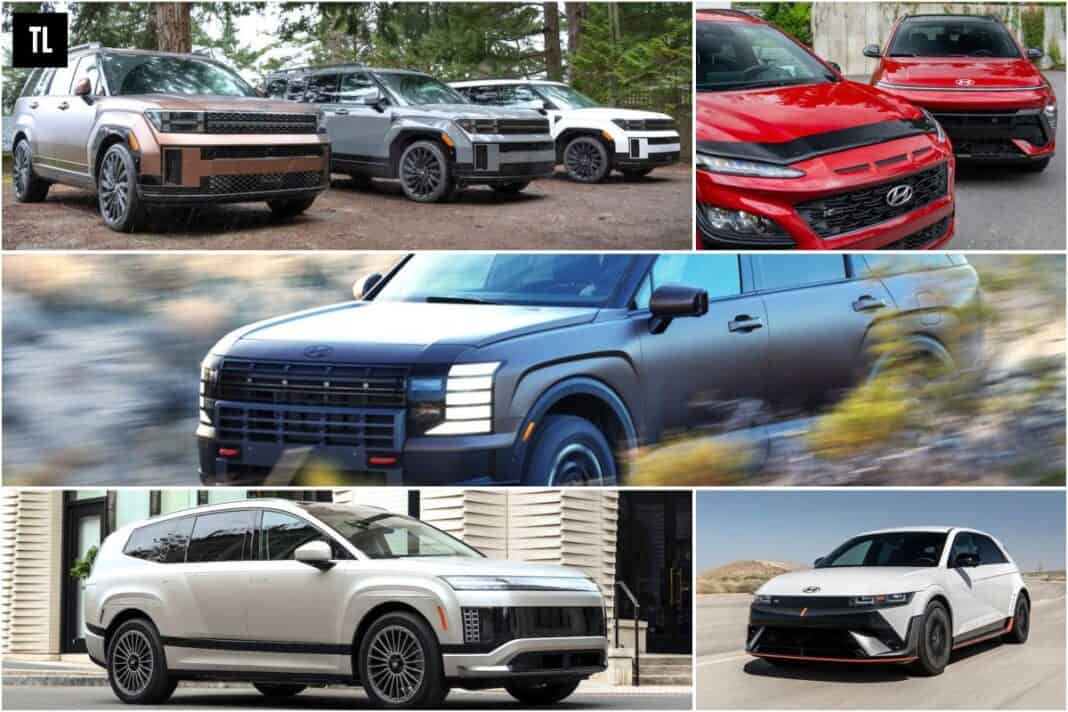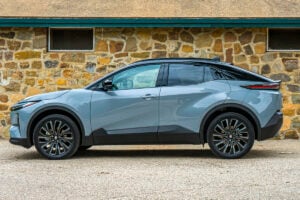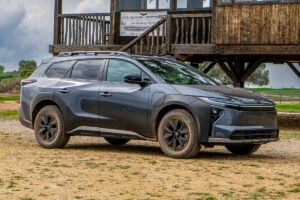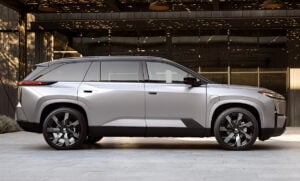This guide is continuously updated for relevance, accuracy, and the most recent info.
Hyundai’s SUV lineup has just about everything covered, from the pint-sized Venue to the three-row Palisade, plus the quirky hydrogen-powered NEXO and a growing mix of hybrids and EVs, including the new IONIQ 9. The only gap? A true full-size SUV. That’s on the horizon, but for now, here’s a look at the models you can buy today:
- Venue
- Kona – Gas
- Kona Electric
- NEXO
- IONIQ 5 (IONIQ 5 N, IONIQ 5 XRT)
- Tucson – Gas
- Tucson Hybrid
- Tucson PHEV
- Santa Fe – Gas
- Santa Fe Hybrid
- Palisade
- IONIQ 9
Hyundai Venue (Subcompact Crossover SUV)

Key features:
Standard 2nd-row dual USB charging
Upgraded 6-speaker audio system
2024 Tucson gains much-needed updates
The Hyundai Venue, introduced in 2020, marks the brand’s entry into the competitive subcompact crossover category. Tailored for city living, the Venue combines the appearance of a traditional SUV with hatchback practicality in a compact design. Hyundai’s commitment to value is evident in the Venue, offering a wealth of standard features at an attractive price. The 2024 model introduces significant upgrades, including standard 2nd-row dual USB charging in SEL and Limited trims, Proximity key with push-button start now available in both SEL and Limited trims, and an upgraded 6-speaker audio system across SE, SEL, and Limited trims, enhancing overall convenience and interior features for an advanced driving experience.
Hyundai Kona – Gas (Subcompact Crossover SUV)

Key features:
More refined looks inside and out; 2025 updates add expanded ambient lighting and upgraded interior features
147 hp from updated 2.0L gas engine
Kona N Line’s enhanced sporty upgrades
Completely redesigned for 2024, the Hyundai Kona brought sleeker styling and a more refined interior while offering two gasoline powertrains: a 2.0L 4-cylinder with 147 horsepower and 132 lb-ft of torque, and a 1.6L turbocharged 4-cylinder with 190 horsepower and 195 lb-ft of torque.
Kona N Line

For 2025, Hyundai made subtle upgrades, including expanded ambient interior lighting, more tech features across trims, and an updated N Line configuration for buyers seeking a sportier design. While the high-performance 276-hp Kona N was discontinued after 2023, the Kona N Line keeps the spirit alive with body-colour cladding, 19-inch alloy wheels, dual exhaust tips, Bose audio, red-accented sport seating, and aggressive wing-shaped fascias that highlight its athletic stance.
Related – Kona reviews and news
Hyundai Kona Electric (EV Subcompact Crossover SUV)

Key features:
260 miles electric range (estimated)
10% to 80% charge in about 43 minutes
Forward “frunk” storage
The second-generation Kona includes an all-electric version that delivers an estimated 260 miles of range with its 64.8-kWh battery, or about 197 miles with the standard pack. Charging from 10–80% takes around 43 minutes using 400V fast charging. For 2025, Hyundai expanded the EV’s appeal with new ambient interior lighting, standard V2L functionality, and a sport-inspired N Line trim.

Compared to the gas version, the Kona EV features battery preconditioning for secure charging in cold temperatures and a night-visible charging port lamp. Distinctive elements include forward “frunk” storage, active grille shutters, and now standard Vehicle-to-Load (V2L) capability across the lineup. The i-PEDAL mode and Smart Regenerative System adapt to real-time traffic conditions, while a bi-directional onboard charger lets the V2L function power devices or charge equipment, from e-bikes to camping gear. The front charging port, with an available V2L adapter, enables battery-powered device use when the car is parked, and for 2025, a new N Line trim adds sport-inspired styling cues to the EV.
Recommended Read: Up Close with the 2024 Hyundai Kona Electric
Hyundai NEXO (Hydrogen Fuel Cell Compact Crossover SUV)

Key features:
World’s first dedicated hydrogen-powered SUV
Hyundai’s Lifetime Battery Warranty
Better than the Tucson fuel cell
First introduced for the 2019 model year, the NEXO fuel-cell SUV is Hyundai’s pioneering hydrogen-powered crossover and remains the only one of its kind on the market. The first-gen model offered zero-emission driving, ~380-mile range, and smooth 161-hp performance.
In 2025, Hyundai unveiled the all-new, second-generation NEXO, featuring a bold Art of Steel design, more spacious and luxurious interior comforts (including curved digital displays and relaxation seats), a more powerful and efficient fuel-cell system, and a quicker 0–100 km/h time of 7.8 seconds. Early prototypes spotted in the U.S. suggest a probable 2026 launch here.
Hyundai IONIQ 5 (Electric Compact Crossover SUV)

Key features:
The bold, hatchback-style design
Very open, spacious cabin with great storage
The 641 horsepower IONIQ 5 N
Few production vehicles resemble their concept variants, but the IONIQ 5 is a rare exception, with futuristic looks unlike any other compact SUV on the road. First introduced for the 2022 model year, it rides on Hyundai’s E-GMP platform, which enhances driving dynamics while maximizing interior space. For 2025, the Ioniq 5 adds a larger battery, pushing range to up to 318 miles (RWD), while keeping ultra-fast 800-volt multi-charging that can take the battery from 10 to 80 percent in about 18 minutes. The latest updates also bring a Tesla-compatible NACS charging port, new tech features, and expanded interior refinements.
IONIQ 5 N

Hyundai is forgiven for dropping the high-performance Kona N with the arrival of this stellar little rocket. The IONIQ 5 N pushes EV performance to new heights, pairing an 84-kWh battery with advanced cooling and control systems to deliver up to 641 horsepower. Features like N Brake Regen, N Grin Boost, N Launch Control, and Track SOC give drivers enhanced stopping power, bursts of maximum output, optimal starts, and lap-by-lap battery consumption tracking on the circuit.
Styling is as aggressive as the performance, with a wing-type spoiler, orange-accented rear diffuser, and functional aero outlets, while inside, the Ioniq 5 N gets unique seats, pedals, and drive-mode cues. For 2025, Hyundai has expanded its global rollout, making this track-ready EV officially available in North America. And yes — it even comes with a rear window washer and wiper.
IONIQ 5 XRT
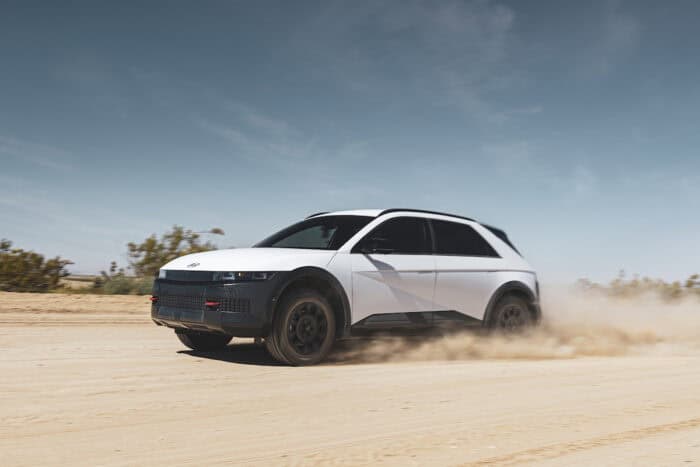
Positioned between the standard model and the N, the XRT features a 23 mm lift, all-terrain tires, and 18-inch rally-inspired wheels. Yes, a rugged IONIQ 5 EV — Hyundai went there. Unique styling touches include digital camouflage cladding and model-specific front and rear fascias, aimed at drivers who want a more adventurous electric crossover. For 2025, the entire Ioniq 5 lineup benefits from larger batteries and improved range, with the XRT adding a new layer of versatility to Hyundai’s EV family. Here’s the full story: New Rugged XRT Adds Even More Versatility to the IONIQ 5 Lineup.
Related:
- A 641 Horsepower Corner Carver: The 2025 IONIQ 5 N Debuts at LA Auto Show
- Inside the 2022 Hyundai IONIQ 5 EV Compact SUV
- IONIQ 5 Dimension Specs: Sizing Up Hyundai’s Sleek New EV
Hyundai Tucson – Gas (Compact Crossover SUV)

Key features:
Complete redesign in 2022; fresh exterior styling, updated tech, and upscale cabin for 2025
Heated seats & steering wheel available
The Performance-oriented Tucson N Line
One of the more familiar nameplates in the Hyundai lineup, Tucson, received a complete redesign for the 2022 model year and now gets a facelift for 2025. Updates include a new grille, reshaped front and rear bumpers, updated wheel designs, and a longer rear wiper for improved visibility. Inside, the cabin gains a panoramic curved display with a 12.3-inch infotainment screen and digital instrument cluster, plus revised HVAC controls with physical knobs for easier use. Heated front seats, heated rear seats, and heated steering wheel are available, as well as ventilated front seats. Under the hood is a 2.5L four-cylinder that pushes 187 horsepower and makes 178 lb. ft. of torque.
Tucson N Line

Yes, even Tucson gets the N treatment. The next-generation Tucson N Line carries over for 2025 with refreshed styling, including a rectangular-shaped bumper beneath the grille, new air intakes, and updated wheels for a sportier aesthetic. At the rear, a lengthened aerodynamic spoiler and fins contribute to a distinctive look. The interior is adorned with black suede N-branded sporty seats featuring red contrast stitching for a sophisticated appearance. Final touches of N design elements are evident on the dedicated N steering wheel, leather gear shift knob, and shift-by-wire console cover.
Hyundai Tucson Hybrid (Hybrid Compact Crossover SUV)

Key features:
30% improved fuel economy vs. gas model
231 horsepower (up from 226)
20% more torque than gas model
Compared to the gas-powered Tucson with the 2.5L, this hybrid version gets about a 30 percent improvement in fuel efficiency. The hybrid powertrain includes the 1.6L turbocharged gasoline engine with 177 horsepower and 195 lb. ft. of torque, combined with a 44.2 kW electric motor and 1.49 kWh battery pack. For 2025, system output increases slightly to 231 horsepower and 271 lb. ft. of torque, putting down 20 percent more torque than the Tucson gas model. The engine pairs with the HEV-tuned six-speed automatic transmission.
Related – 2022 Hyundai Tucson Hybrid Review
Hyundai Tucson Plug-In Hybrid (PHEV Compact Crossover SUV)

Key features:
Turbo 1.6L with 28 mile range from motor
Level-2 charges in under 2 hours with on-board charger
Fuel economy of over 70 MPGe
The Tucson PHEV also finds the 1.6L turbo, but the specs differ slightly from the hybrid. Paired with a six-speed automatic transmission, the Tucson PHEV’s 13.8 kWh battery yields an estimated all-electric range (AER) of 28 miles and an estimated fuel economy of over 70 MPGe. Level-2 charging takes less than two hours using the 7.2 kW onboard charger. For 2025, the PHEV benefits from the broader Tucson refresh, with updated exterior styling, a reworked cabin featuring a panoramic curved display with dual 12.3-inch screens, wireless Apple CarPlay/Android Auto, and improved ergonomics for a more user-friendly experience.
Hyundai Santa Fe (Mid-Size SUV)

Key features:
Choice of 2.5L turbo gas or 1.6L turbo hybrid powertrains
Wide liftgate design creates a terrace-like open space
Santa Fe XRT’s high ground clearance & black styling
The elder statesman in Hyundai’s SUV roster, the Santa Fe, has seen plenty of change over the years — from major design shifts to even offering a third-row option at one point. It was fully redesigned in 2019, refreshed in 2021, and transformed again with the latest generation. Yes, it’s still a Santa Fe, but with a completely new look and layout, plus the addition of the rugged XRT trim with off-ready features and blacked-out styling upgrades.

Under the hood, a 2.5L turbocharged gasoline engine produces 277 horsepower and 311 lb-ft of torque, while the longer wheelbase enhances third-row seating and opens up the most spacious interior and tailgate opening in its class — resembling a terrace-like space. Premium touches include a Relaxation Seat with Leg Rest, UV-C Sterilization Tray, dual wireless smartphone charging, and a Panoramic Curved Display, among others.
Related:
- First Drive: 2024 Hyundai Santa Fe XRT Review
- First Drive: 2024 Hyundai Santa Fe Ultimate Calligraphy Review
Hyundai Santa Fe Hybrid (Hybrid Mid-Size SUV)

Key features:
1.6L Turbocharged Hybrid (no PHEV in North America)
Increase in second-row legroom (1,055 mm)
Third-row legroom has expanded (761 mm)
The hybrid variant powertrain is a 1.6L Turbocharged Hybrid with a maximum output of 232 horsepower at 5,600 rpm and 271 lb. ft. of torque at 1,000 – 4,100 rpm. There is a Santa Fe plug-in hybrid (PHEV) model, but only in Europe, so North America only gets the turbo gas and turbo hybrid. The new Santa Fe Hybrid also offers a 20 mm increase in second-row legroom, extending it to 1,055 mm. Additionally, the third-row legroom has expanded by 15 mm, now measuring 761 mm in length. The Santa Fe Hybrid returns an EPA-estimated 36 mpg city / 35 highway / 36 combined (AWD), making it significantly more efficient than the gas-only model.
Related – Santa Fe reviews and news
Hyundai Palisade (Mid-Size SUV)
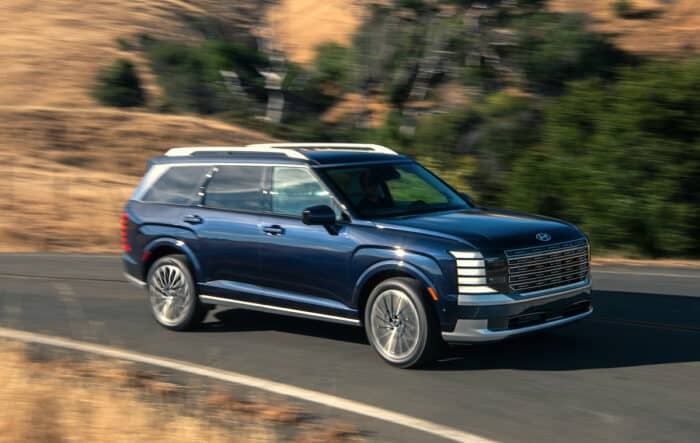
Key features:
Complete 2026 redesign and new XRT Pro
Available with new hybrid powertrain (329 hp / 339 lb-ft)
Latest tech: dual 12.3-inch panoramic displays, Relaxation Seats, upscale cabin finishes
The largest Hyundai SUV (though not quite full-size), and first introduced in 2020, the Palisade has always been the brand’s go-to family hauler and road trip companion. For 2026, it enters an all-new generation with a bolder design, more tech, and fresh powertrain options. No longer just a stylish midsize, the Palisade now offers new hybrid choices, a more refined interior, and an expanded trim lineup that includes off-road-ready models, further cementing its role as Hyundai’s flagship SUV.
Related – Palisade reviews and news
Palisade XRT Pro
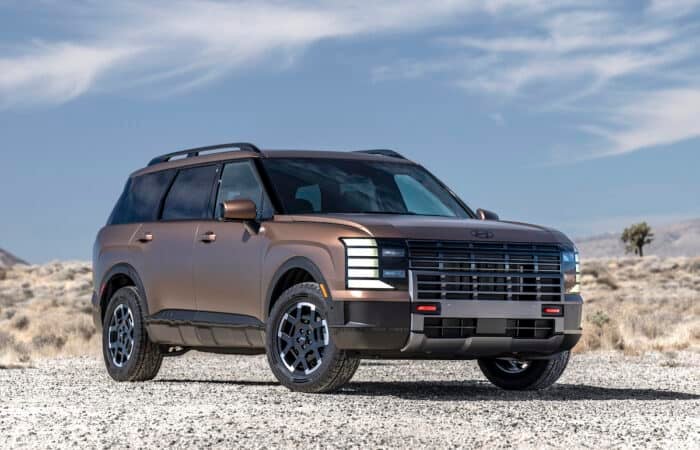
The new XRT Pro isn’t just a dress-up package; it’s built to get dirty. With AWD, 8.4 inches of clearance, all-terrain tires, dedicated Mud/Sand/Snow drive modes, and recovery hooks bolted to the frame, it brings real trail cred to the Palisade lineup. Power still comes from the V6, but this trim dials up the off-road intent, starting around $50,865. We wouldn’t call it a true off-road SUV, but for most families, this one does the trick.
Palisade Calligraphy
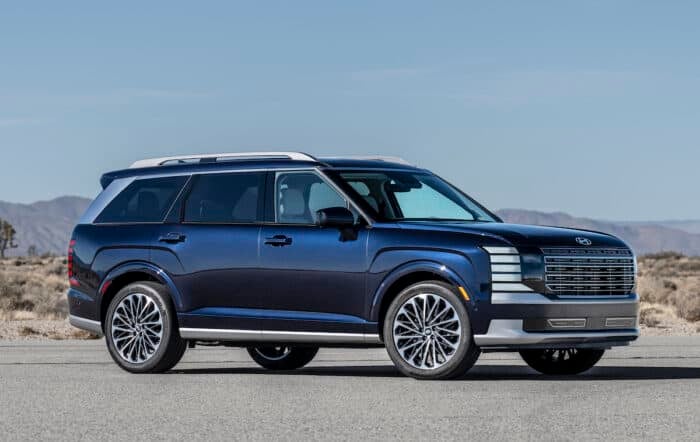
The cream-of-the-crop Calligraphy blends premium styling with lavish comfort—think ultra-lux materials and second-row relax seats. Powertrain options include the V6 or the new hybrid with 329 hp / 339 lb-ft, making it the most compelling combination of elegance and efficiency, starting around $55,555 for V6 and $57,775 for the hybrid
Hyundai IONIQ 9 (Mid-Size 3-Row EV SUV)
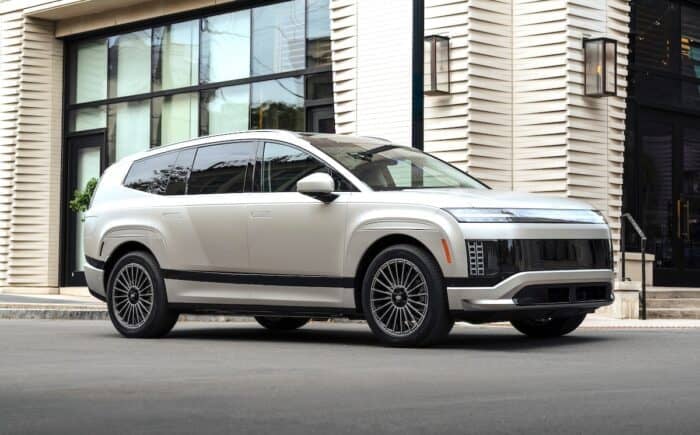
Key features:
First three-row all-electric SUV from Hyundai, arriving for the 2026 model year
Targeted range of 300+ miles with ultra-fast charging and AWD capability
Spacious, lounge-inspired cabin with advanced tech and sustainable design
Hyundai’s SUV lineup will soon gain a flagship all-electric family hauler in the form of the IONIQ 9, arriving for the 2026 model year. Previewed globally as the IONIQ 7 concept (Seven Concept), the production model will slot above the IONIQ 5 as Hyundai’s first large-scale electric alternative to the Palisade. It promises bold styling, a spacious lounge-like interior with sustainable materials, and Hyundai’s latest connected technology. With an estimated range of 300–335 miles, ultra-fast charging, and available all-wheel drive, the IONIQ 9 is set to become Hyundai’s most advanced SUV yet—also, a rare breed, as all-electric 3-row SUVs are hard to come by at the moment.
- 320
- 1.3Kshares

